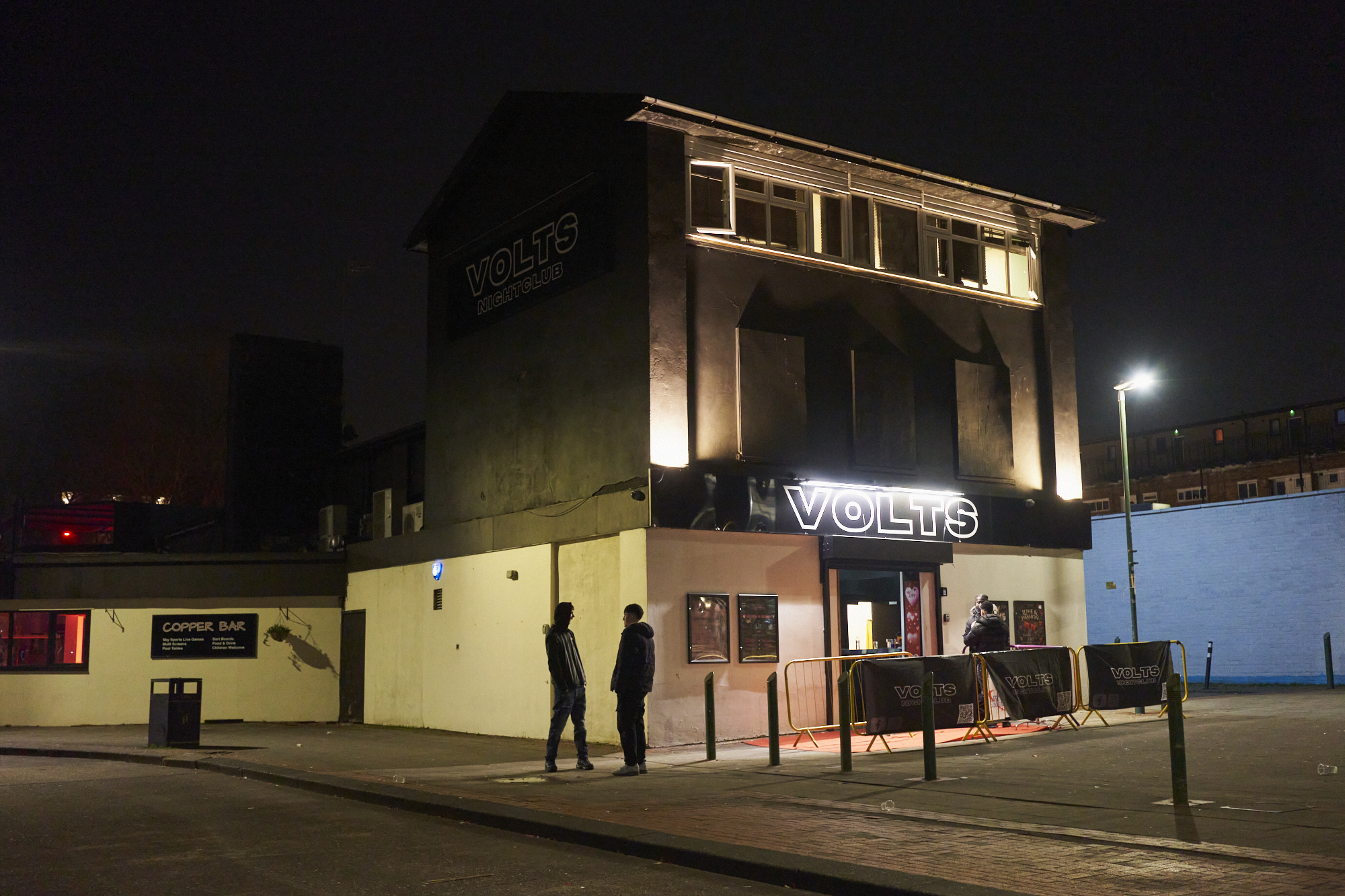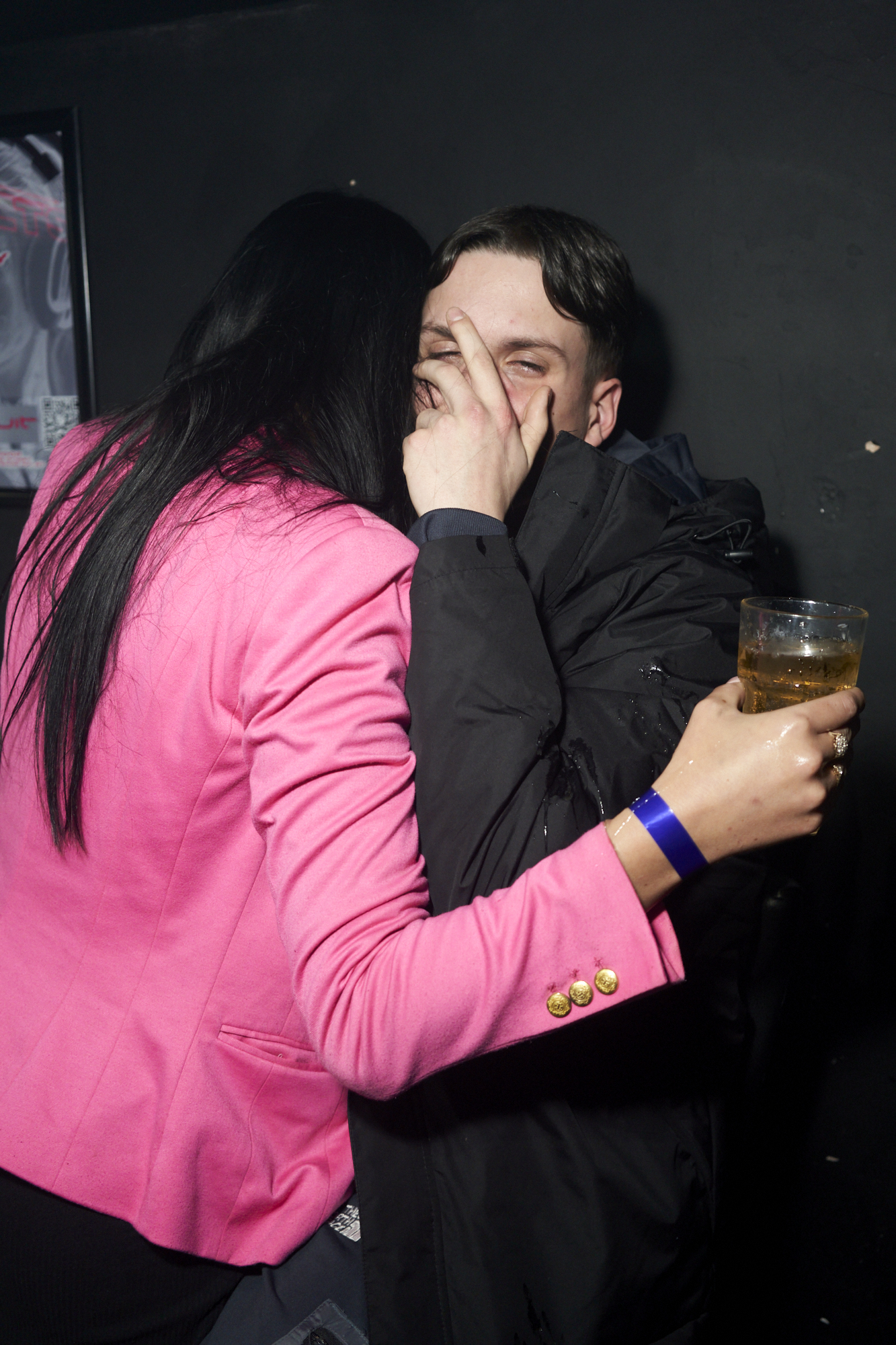What’s left of our once-proud provincial nightclubs?

Words by Clive Martin
For years Clive Martin documented the banalities of UK nightlife – the rhyming toilet attendants; the two-for-one shots deals; the endless Tinie Tempah spins. But in a post-COVID world, what’s left of our once-proud provincial nightclubs? We sent him out to Hertfordshire to find out how they’re adapting.
Sugarcubes. Faces. Liquid. Oxygen. Joanna’s. Valentino’s. Jesters. Rhino. Zanzibar. The Office. The Works. Club Bongo. Club International. Club Nirvana. Japanese Whispers. Blue Bamboo.
For decades, the names of these establishments combined to create an unofficial map of the British Isles – a parallel, late night dimension of lasers, mirrors, pleather loveseats, velvet ropes, and bloodied bathroom floors. Unlike the Fabrics and Theklas, these spots never hosted the best night of anyone’s lives, nor would they be lionised in that Bicep video, but they were always there as reliable as a Boots and as dangerous as an abandoned funfair.

Today, we mostly speak about them in the past tense, because such places are in grimly short supply. The facts are well known now: over the last 20 years, nearly half of the UK’s clubs have shut down, while many decent-sized towns cannot claim a venue that stays open later than Wetherspoons. In response, a cottage industry of concern has popped up, one played out mostly in panel discussions, and led by bodies like the Night Time Industries Association and the Independent Nightlife Committee – as well as vocal clubland figures like Warehouse Project’s Sacha Lord and, until recently, Amy Lame, London’s lamentable ‘Night Czar’.
These preservation efforts are all very well and good, but it can seem that in this particular discussion, not all venues are created equal. Most of the campaigning is geared towards establishments that are perceived to have ‘worth’, while your fish bowls ‘n’ fist fight joints are forgotten; cast aside as the ugly cousins of clubland. When Fabric nearly closed back in 2016, there were statements from Sadiq Khan, pleas from Nina Kraviz and Goldie, and floral tributes left outside the venue. But when Club Inferno in Plymouth closed down last year, there was no such campaign. The implication is that some places are worth saving, and others aren’t so much.

It’s easy to feel dire about the predicament of high street clubs, and it's even easier to ignore them entirely – because really, how many of us frequent these places anymore? Even among the natural audience of horny teenagers, habits are changing - the TikTok Live replacing the light-up dancefloor as a social-sexual space. But what perhaps has been neglected, is that there are still plenty of independent local night spots around. It’s just that, increasingly, they don’t look or behave like the ones in our nostalgia-soaked recollections. Instead, they employ a hybrid, multi-faceted, fluid, and highly entrepreneurial model.
Canvas, in Watford, is one such establishment. We began our expedition there because Watford has always played an outsized role in the British nightlife psyche. For years, the Hertfordshire satellite town was home to a notorious branch of Oceana (later Pryzm) that attracted punters from all over the South East. The club’s proximity to London and the surrounding areas has always made it an unlikely destination for chaos, and a butt of a thousand jokes. The club was even named as the fourth ‘most tragic’ in the UK by The Tab in 2016, before its parent group Atik went into administration, shuttering the club and pushing it into its current status as a comedy venue.
Canvas has picked up some of the slack that Oceana and Pryzm left behind. On first impressions, Canvas – formerly Aura, formerly Paparazzi, formerly Bar:Me, formerly Rehab, formerly Hogwash – is your archetypal high street club. It’s early when we arrive, but already inside are a crew of young lads with ‘Beaker from The Muppets’ haircuts, sliding across the floor to ‘We Found Love’ (which segued neatly into Nicki Minaj’s ‘Starships’.) Next to them is a drunk girl in office attire grinding up against a pillar, while LCD screens show test cricket and Monzo adverts (provincial clubs are a bastion of out-of-home marketing.)

But Canvas, like many venues, has been forced to adapt. Upstairs is a huge, semi-open shisha lounge, with an extensive food menu designed by Papa Ji, an award-winning street food caterer. They’re also running a number of events and nights that eschew the traditional clubland economy, from private parties to themed brunches – and even under-18s events. “I had to confiscate 40 vapes from those kids,” owner Vikki tells us, as we share a hookah pipe.
“The lounge up here is much more relaxing,” she continues. “It’s safe, secure, private. People come here not to be noticed, whereas downstairs people want to let their hair down and have a few drinks. Then there’s those who want a fusion between the two.”
Despite its humdrum reputation, Watford is a populous, and highly diverse place. For Vikki, recognising this is key to Canvas’s survival. “I’ll give you an example,” she says. “We had a group of girls here the other week – they wanted to go out – but one was Muslim, and only wanted the shisha. They wouldn’t have gone to a pure shisha lounge, or to a venue that doesn’t cater for the girl who doesn’t drink. But we offer everything, and they came and had a great night. If people want to come and drink just water, they can. We don’t push the alcohol.”

“Diversifying even extends to the music our DJs play” she adds. “We get all kinds of customers. Some want the old school stuff, some want the modern stuff. If we say ‘we’re just playing house music’, we could turn a lot of people away. So our DJs might start off with the stuff you can hear tonight, but if we get a large group of Brazilians, or Albanians, or Romanians, you might have to switch it up for them. A DJ has to work twice as hard to keep the crowd these days.”
We take a quick trip to the smoking area and survey the Watford strip, where Canvas sits in a prime position: directly opposite Walkabout, Popworld, and Slug & Lettuce, three titans of the nightlife business who, not uncoincidentally, are all owned by the same group – the notorious Stonegate. Before setting out, a clubland insider told us that Stonegate are applying something of a monopoly on what’s left out high street nightlife. Not only does the company have vast reserves of capital that the independents could never compete with, they will often use sly tactics to maintain their crowd, such as bouncers suggesting people move on to another Stonegate venue when one closes.
I ask Vikki how a club like Canvas can survive with this kind of competition. “You have to adapt,” she says. “It’s simple things like considering your open times, and the charges to apply then. You might have to give away bottles or discounts to get groups in. Before COVID the model was people coming in and drinking lots, but now it's much more about needs and wants.” Vikki and her security staff seem to think it's a quiet night ahead, but despite this the place is doing well in general. But in an industry so based on vibes and whims and collective moods, a washout is always a possibility.

As an ambulance pulls up outside Popworld, we decide to leave Watford and head off to our next venue: Volts in nearby Hemel Hempstead. After a short cab ride bombing through country lanes blasting Kiss FM, we arrive at this strange, rather ad-hoc venue. Volts (formerly The Function Rooms, formerly Frooms, formerly The Friars Inn, formerly The Market Arms Tavern) is a very different prospect to Canvas: a stand alone establishment in an old, gigantic pub, plonked in the middle of a new-town shopping centre, which makes it sort of look like a location from Bronson.
We arrived with the party in full swing, and were ushered immediately in by Poppy the pink-haired manager, to a strange, thrillingly old school vision of a club. Inside are a crowd of teenage boys wearing pocket squares, Sean Dyche lookalikes in Stone Island polo shirts, and at least one fully paid up drainer. On the main dancefloor the DJ scratches and MCs through ‘No Games’ and ‘Murder She Wrote’. Upstairs has been taken over by a local tech house collective, HiCircuit, and seems to be emptier with a much older crowd chugga-chugging along.
In the rooftop smoking area, which looks directly into what appears to be some kind of dilapidated, sheltered accommodation, we meet a man who asks us to delete a picture of him in case his wife sees him out and about when he should be at home. A local Airbnb landlord offers us a place to stay and shows us videos of him practicing karate. One ponytailed young man, noticing Sir! editor Jimmy McIntosh’s coat, compliments him, and then incongruously asks if he’s a gamer. There’s so much vaping going on it all almost looks like dry ice.

Clearly Volts operates like clubs used to: a place that's simply open, offering low stakes debauchery at a local scale. As the only club in a many-mile radius, it naturally attracts punters from all demographics. Its appeal is beautifully simple: it's open late and there is a non-zero chance of getting off with someone there. Being here brings back memories of my twenties, watching the proto-viral star Mr Oi Oi doing ‘the snake’ at place in South Shields; seeing Arg from The Only Way Is Essex do the Harlem Shake and then get kicked in the shins at a personal appearance in Milton Keynes; my brother snogging a girl in a ‘Vote For Pedro’ t-shirt at Bacchus in Kingston.
Leaving Volts, I’m glad it's still operating as a pure pisshole. But my eyes are attuned to the clubs I see around me, and I’m not sure I like the change. In Falmouth, my old stomping ground, I noticed that Mangos (a club notorious for its over-zealous bouncers) has added a shuffleboard. I’m tempted to go to a few of these places after my Hemel trip, but something pulls me away from them. I’m too old, too conspicuous, too tired and, ultimately, not desperate to hear a crowd chant ‘Fatman Scoop, Crooklyn Clan!’ anymore.
And then something bizarre happens. The club comes and finds me. On a train back from the West Country one evening I’m struck by a horrifying dose of norovirus. I try to make it back to London but everything in my body is telling me that I need to get off the train and lie down. So I stumble off the train at Reading, fire up the first place on Booking.com that doesn’t look like a certifiable health hazard and check in.

It turns out to be The Market House, a hotel which sits above what appears to be a club. I pick up my key, trying to hold my stomach amidst the aromatic onslaught of Jagermeister downstairs. Practically seeing God, I'm forced to lie there, looking at the ceiling while Pitbull mashups play – like the opening scene of Apocalypse Now had it been reimagined by Wayne Lineker. I wonder if this is some kind of retribution for being lured back into the club world at my age. I think I’m in for the long run here, reduced to throwing my guts up until ‘Don’t Stop Believin’ plays at 3am.
But then, suddenly, it stops. I look at my phone. There’s only silence. The club closes at midnight, just like (almost) everywhere else these days.